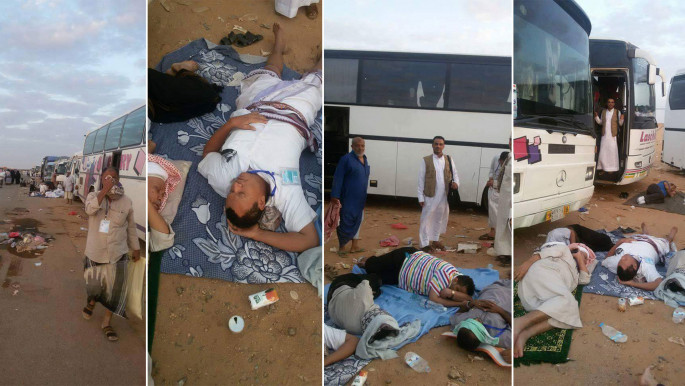A woman who introduced herself as Um Abdul-Wassei told The New Arab she has been stuck at the border since Wednesday in very difficult conditions.
"I cannot bear the heat of the desert and the scorching sun. I cannot leave the bus because there is nothing here: no shops, hotels or cafes," she said.
 |
The pilgrims have been sleeping in the desert and are running out of food and water. |  |
The pilgrims have been sleeping in the desert and are running out of food and water.
The crossing has stopped admitting pilgrims since Wednesday, Murad Sabih, director of Islamic Endowments in Hadramout Valley, told The New Arab.
"There are more than 60 buses stranded since Wedneday morning, amid a total lack of the most basic facilities for the pilgrims."
A report by the Gulf News on Saturday put the number of buses at 300.
A source in an emergency committee set up to process Yemeni pilgrims blamed slow procedures on the Saudi side for the delay.
The source, who asked not to be named, said the Yemeni government has not yet made any effort to reach out to the Saudi authorities to facilitate the crossing of Yemeni nationals for the Hajj.
Fewer than 8,000 out of 19,400 registered Yemeni pilgrims have made it into Saudi territory, the source said.
"Conditions are very difficult for the Yemeni pilgrims at the crossing. We need the Yemeni government to step in because there is nothing we can do for the pilgrims."
According to Gulf News, Yemen’s foreign minister Abdul Malik Al Mikhlafi said the government had formed a committee and asked them to visit the stranded pilgrims.
But the government blamed travel agencies for not adhering to an agreed date to bring their pilgrims to the border.
Fuad Omar Bin Al Shaikh Abu Baker, minister of endowment, told Gulf News on Saturday that the agencies rushed to the border out of fear of not arriving in Mecca on time.
Abu Baker said that more than 11,200 Yemeni pilgrims have crossed into Saudi Arabia and 6,000 are still stranded on the border.
“We are heading today to the border to provide the stranded people with food and tents,” Abu Baker said.



![President Pezeshkian has denounced Israel's attacks on Lebanon [Getty]](/sites/default/files/styles/image_684x385/public/2173482924.jpeg?h=a5f2f23a&itok=q3evVtko)



 Follow the Middle East's top stories in English at The New Arab on Google News
Follow the Middle East's top stories in English at The New Arab on Google News


